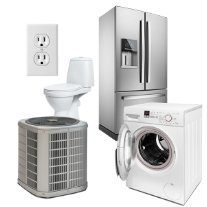Remodeling and updating your kitchen is a huge project. It’s also one of the most popular and potentially expensive home renovations you’ll ever make. Today, we’ll share three kitchen remodel tips to help you make this massive undertaking worthwhile.
1. A kitchen remodel requires planning
The most important thing you’ll need to do is begin your planning. Full kitchen renovations can take anywhere from three to five months, and smaller remodels will also take a noticeable amount of time. So, your best bet is to plan, rather than jump headlong into a complex project.
There are lots of questions to consider, but here are a few to get you started.
What’s your budget?
The average cost of a full remodel is $25,000, which includes new plumbing and electrical. More specifically, you can expect to pay about 10% of your home’s purchase price if you do a full kitchen remodel (e.g., $400,000 house = ~$40,000 kitchen remodel). Even smaller remodels will run thousands of dollars.
Don’t corner yourself. Be realistic and honest about what you can afford before you start planning. It’s a sinking feeling when you design a dream kitchen remodel only to find you can’t come anywhere close to affording it.
And remember, you may not need a full remodel. Updating with new appliances, cabinets, or paint can sometimes suffice.
How will you use your kitchen?
Do you like to cook from scratch and entertain? Or do you prefer quick meals that require less effort? Knowing how you intend to use your kitchen can guide how you remodel.
As you start thinking about a kitchen remodel, consider how you use your current kitchen setup. Do you like the way the kitchen flows as you use it, or do you find yourself bumping into things and feeling claustrophobic?
Tracking your movements throughout the kitchen can help you determine what you’d like from a kitchen remodel.
How much space do you need?
This goes hand in hand with how you use your kitchen. For the sake of ease, consider two common scenarios.
If you’re comfortable with how your kitchen flows, you may not need to do a full remodel. However, you’ll still need to consider measuring for things like new appliances. For instance, if you want a new fridge with French doors, make sure they can both swing open easily in the spot you intend to put it.
If you don’t like how your kitchen flows, you may need to think about the space you’ll need to make it do what you want. You’ll also need to think about where certain appliances will go relative to others.
Who’s doing the work?
After you figure out what you want from your kitchen remodel, you’ll need to consider who does the work.
If you’re doing a full remodel, you may not have any work to do yourself. But you’ll need to research remodelers to find the right one for your needs.
However, if you’re doing a smaller remodel (some new appliances, new paint), you may be able to do it yourself.
Know what you’d be comfortable doing yourself and what you’re not confident in doing yourself. When in doubt, such as for things like making sure a gas oven is properly installed, use a professional.
2. After you plan, research contractors
Having an idea for what you want to do will help you research appropriate contractors. If you don’t have an idea for what you want, it’s much harder to find the appropriate kind of contractor.
To begin your search, ask friends, neighbors, and even your real estate agent for recommendations. You can also use customer reviews on Google, Yelp, and other third-party sites.
While specific services may vary, there are a few things you should always demand from any contractor you consider.
- Proof of licensing and insurance
- Samples that show a strong body of work
- Clearly stated expectations for scope and costs
- Information about the people doing the work: Are they employees or subcontractors?
After you find contractors that meet the criteria above, you can begin to explain the nuts and bolts of what you want in the project. Make sure you provide an expected timeline.
At the end of the day, the contractor who agrees to work on your terms as much as possible is the right one.
3. Always communicate with your contractor
Once you’ve hired a contractor you’re comfortable with, make sure you stay in contact with them. Don’t be afraid to set ground rules on the following (after all, it’s YOUR house):
- Your expectations on time frame
- Where workers are allowed to go in your house, and which places are off limits
- Determining who’s going to schedule required inspections and when
You’re going to see these people a lot over the next quarter year or so. Being open, honest, and realistic with them will help the project go much more smoothly.
Conclusion
Planning, researching, and communicating are the three pillars of a successful kitchen remodel. And once you’ve got the kitchen of your dreams, remember that a Home Warranty Service Agreement from 2-10 Home Buyers Warranty (2-10 HBW) can help protect your budget against breakdowns to the things that make your house a home.
2-10 HBW offers the most comprehensive home warranty coverage for homeowners. Let us help you protect your home.
Related content
The 3 Best Home Improvement Investments to Make








